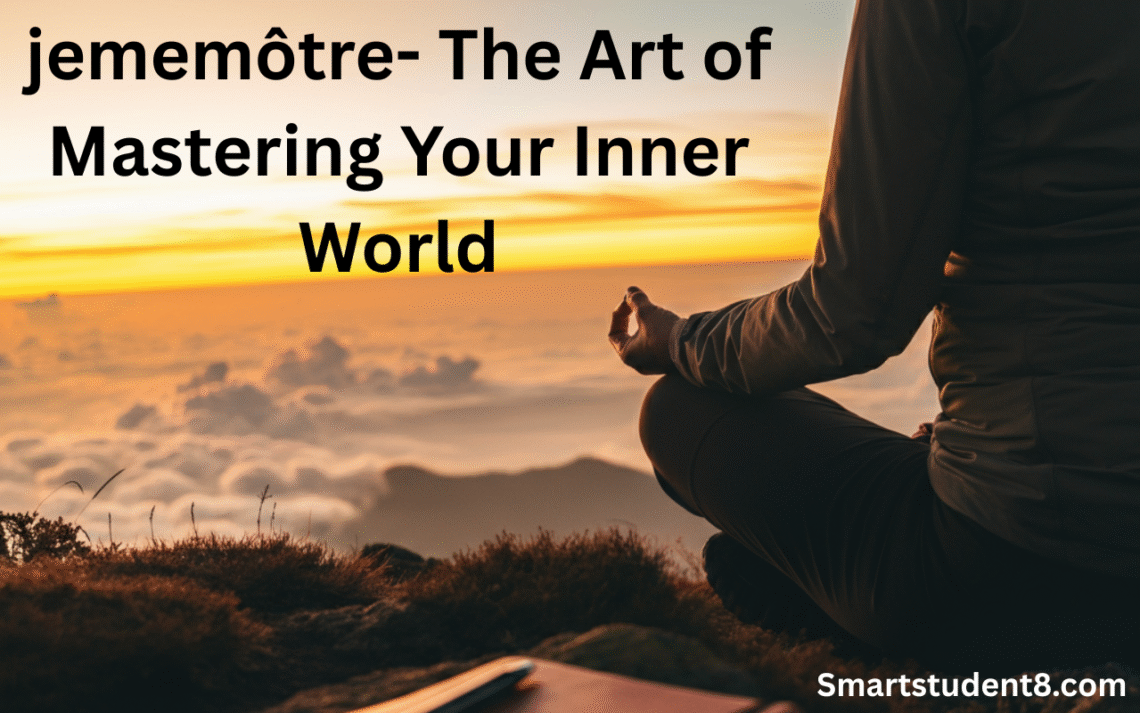It was like discovering a secret when I first heard the word “jememôtre”. It’s elegant and a little mysterious, like something from an old French novel, or a fantasy story. As I looked into the concept further, I found that it was not about fantasy. It’s more about personal growth and living with intention. jememôtre, more than a single word, is a philosophy that has changed the way I live my life, set my goals, and feel about myself.
It helped me look inward to understand my motivations better and take control of my journey. This guide will explore the world of jememôtre, including its origins and how to apply its principles in order to live a more fulfilled life.
The word itself is modern, more of a fusion of ideas than an ancient word. Its greatest strength is this. We can customize it to suit our needs because it is not bound to one rigid definition. jememôtre core message is to become the master of your life, not in an aggressive or dominating way, but by gaining self-awareness and discipline. It encourages people to take control of their lives and stop letting them happen.
jememôtre: Decoding its Meaning
It is important to understand jememôtre by breaking down the word. It’s not an official word, but its structure strongly suggests French roots. Look at the words: “je”, “me”, or “myself” and “motre”, which sounds similar to the French word “maitre” for “master.” You can say, “I am my master” or “I master myself.” This interpretation is the most accurate. This is a declaration about personal responsibility and self-sovereignty. It is the choice you make to guide your own life.
Jemimah, however, is not just a translation. It is a philosophy that incorporates several key concepts: self-awareness and intentionality. Knowing who you are and what you value is key to aligning your actions.
Imagine it as the opposite of living on autopilot. We often react to external pressures – emails, notifications, and social pressures – without ever pausing to consider whether our actions are truly reflective of our inner desires. jememôtre involves pausing to reflect and then choosing a meaningful path. Self-leadership is the art you leading and following your journey.
The Evolution and Origins of a Modern Philosophy
jememôtre doesn’t appear in any standard dictionary. Its origins are therefore fluid and conceptual. It appears to have evolved from online discussions, modern philosophical musings, and a fusion of ideas from self-help, mindfulness, and existential thinking.
The lack of formal history is not a flaw, but a feature. The concept can be adapted and personalised. jememôtre, unlike ancient philosophies that had strict rules and rigid frameworks, is a framework you can customize. It is inspired by various traditions that place emphasis on inner work.
In its emphasis on self-control and resilience, you can hear echoes from Stoicism. At the same time, we cannot control external events we can still control how we respond to them. jememôtre is built on this principle. You can also find parallels with Buddhist mindfulness, which emphasizes the importance of being aware and present to your thoughts and emotions without judgment.
Jemmetre adds a layer of active guidance to this. Once you become aware, you can choose your actions consciously. It is also in line with modern psychology. Specifically, concepts such as self-efficacy, the belief that you can succeed, and the growth mindset.
Jemmemotre: The Art of Intentional Memory
Jemmemotre has many fascinating applications, but one of the most interesting is the application of memory to our digital age. In our digital age, we have outsourced our memory to our devices. Your phone can remember phone numbers and appointments. And your social media feed can remember your highlights. What is the price of this convenience? Jemmemotre is a practice that can be translated as “I recall myself” or, more actively, “I remember with purpose.” It is the act of engaging deeply with your life to create lasting memories rather than digital archives.
This was a game-changer for me. I used to take hundreds of pictures at concerts, only to discover later that I watched the whole show on my phone. I was outsourcing my experience. When practicing jemimetre, I had to put my phone down. It meant concentrating on the music, the energy of the audience, and the way the lighting painted the stage.
I became more than a passive observer; I became an active participant. My memories were more than just data points. They were multisensory and emotionally charged. This is not a rejection of technology. Balance is the key. It’s all about using your mind to experience and remember what really matters. It is a brain workout that strengthens neural pathways while deepening the connection with your life story.
How to Develop jememôtre Everyday
It’s not about making huge, radical changes. It is about making small, intentional, and consistent shifts to your habits and mindset. It is a journey, not a goal. Over time, small steps build on each other, forming a solid foundation for a life that is more self-directed. Here are some ways you can cultivate jemimatre right now.
- Start a Reflection Journal. It is the best tool to practice jemere. You can dedicate 10-15 minutes a day to writing. Do not worry about grammar and structure. Reflect on your day. What did you accomplish? What did you do? What decisions did you make and why? The simple act of putting your feelings and thoughts into words helps you develop a profound sense of self. You can identify patterns of behavior and thought that you may otherwise have missed.
- Observe the world without a screen. Take a few minutes to observe your surroundings. Engage all of your senses, whether you’re in a park or waiting for coffee. Be aware of details, such as the color of the leaves or the sound of distant traffic. This helps you to stay in the moment and trains your mind to be an active observer.
- Make Intentional Goals. We often set goals that are based on what we think society, family, or peers expect us to achieve. jememôtre encourages people to set goals that are aligned with their own values and desires. Ask yourself why you want to achieve this goal. Do I really care about this, or am I pursuing someone else’s idea of success? You can then ensure that your energy invested in your goals is contributing to your own personal fulfillment.
jememôtre : A Way to Improve Self-Awareness
Jemmetre’s core is self-awareness. Understanding yourself is essential to being able to control your life. It means understanding your inner world, including your thoughts, feelings, strengths, weaknesses, values, and motivations. This may sound simple, but it is a practice that will last a lifetime. Most people have a shallow understanding of the reasons they do things. jememôtre means to go deeper.
Lack of self-awareness can lead to a reactionary life. Over the years, I have said “yes” to many projects and commitments that drained me of energy and left me feeling unfulfilled. I had a default mode of pleasing people. Only after I began journaling and practicing jememôtre principles did I begin to see this pattern. My desire for external approval was overriding the need for my personal well-being. This realization was the first step towards change.
Before responding to requests, I would pause and ask myself if it was in line with my goals and values. This conscious decision-making practice, which is rooted in awareness of oneself, has been transformative. This practice allowed me to reclaim time and energy to do the things that really mattered to my life.
Building Resilience With a Jemenemetre Mindset
There are many challenges in life, including setbacks and unexpected twists. Resilience is a way to overcome these challenges and come back stronger. The jememôtre mentality is an effective tool to build resilience. You will be less affected by external chaos when you have a strong self-identity and are rooted in your values. You will become more like a tree that is firmly rooted and can weather any storm.
The resilience that comes with this understanding is the ability to control your own response, even if you don’t always have control over what happens. Self-mastery is a matter of this kind. Someone who practices jemimetre does not immediately become a victim or give up when faced with a failure. They pause to assess the situation and then consciously decide their next step.
It could be that they reframe the setback to be a learning experience, focus on aspects of the situation that they can control, or allow themselves to feel their disappointment without letting it define them. It is important to remember that this inner strength isn’t something you were born with. Instead, it can be developed through self-awareness.
Enhancing Your Decision-Making Abilities
You make hundreds of decisions every day, from what to eat at breakfast to how you will handle a big work project. Your life’s quality is heavily influenced by your decisions. jememôtre encourages you to make thoughtful, conscious decisions instead of impulsive ones. It’s all about aligning small and large decisions with your vision of your future.
Consider a life-altering decision like a change of career. If you are unhappy with your current position, you might react by jumping on the first attractive job offer. A jemere is more deliberate. This requires deep reflection. What is my true career goal? What type of environment makes me thrive? What are my core beliefs, and how could my career reflect these? You’d research your options, speak to people from different fields, and perhaps even try out a side project.
The decision you make would not be an emotional reaction but rather a deliberate step towards a better future. The same thoughtful process can be applied to smaller decisions. It is a small decision to read a book for an hour instead of scrolling on social media. But it will have a big impact over time.
jememôtre : The Benefits in Real Life
The philosophy of Jemimetre has tangible benefits for your daily life. You will begin to notice positive changes in relationships, career, and overall well-being when you start living with more intention and self-awareness. You begin to feel in charge of your life and less like an observer.
- Healthy Relationships: You can better communicate your needs and limits when you know yourself. It leads to more authentic, healthier relationships. You’ll attract people who are in tune with your true nature, and be better equipped to resolve conflicts because you don’t react out of emotion.
- More Career Fulfillment: By aligning career choices with values, you can work that provides not only income but also meaning and purpose. A jemendary mentality can help you to find growth and contribution opportunities in a role that may not be your dream job.
- Better Emotional Balance Jemimah encourages the observation of emotions without judgment. This practice, which is often associated with mindfulness, creates a gap between the emotional trigger and reaction. This space gives you the opportunity to decide how to respond to an emotional trigger, resulting in greater emotional stability and reduced stress.
Conclusion: Accepting your role as master
jememôtre invites you to become the main creative force of your life. It is an empowering and beautiful concept. It’s a quiet revolution that takes you back to your inner wisdom and away from the noise of external life. It is about changing a passive life to one of active creation. The journey of Jemmemotre does not involve perfection. It is about showing up with awareness, compassion, and intention.
jememôtre, when broken down, is not an abstract concept. By understanding its philosophical roots and exploring its practical application, we can understand that it’s not. It is a path that leads to a life of greater authenticity and fulfillment. The simple, yet profound, decision to accept responsibility for one’s inner world is the first step. Take a minute today. Pause, breathe, and ask yourself, “In what small way am I my own master now?” This is the beginning of the rewarding journey to Jemmemotre.





